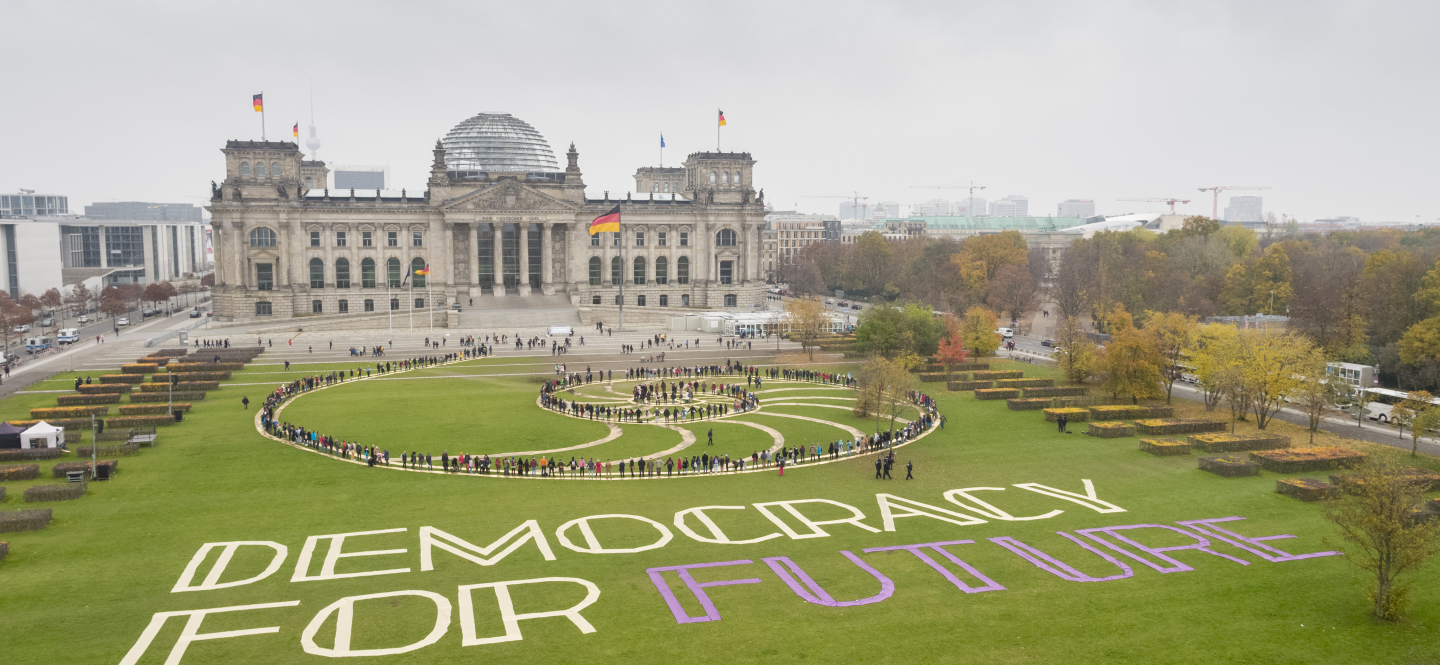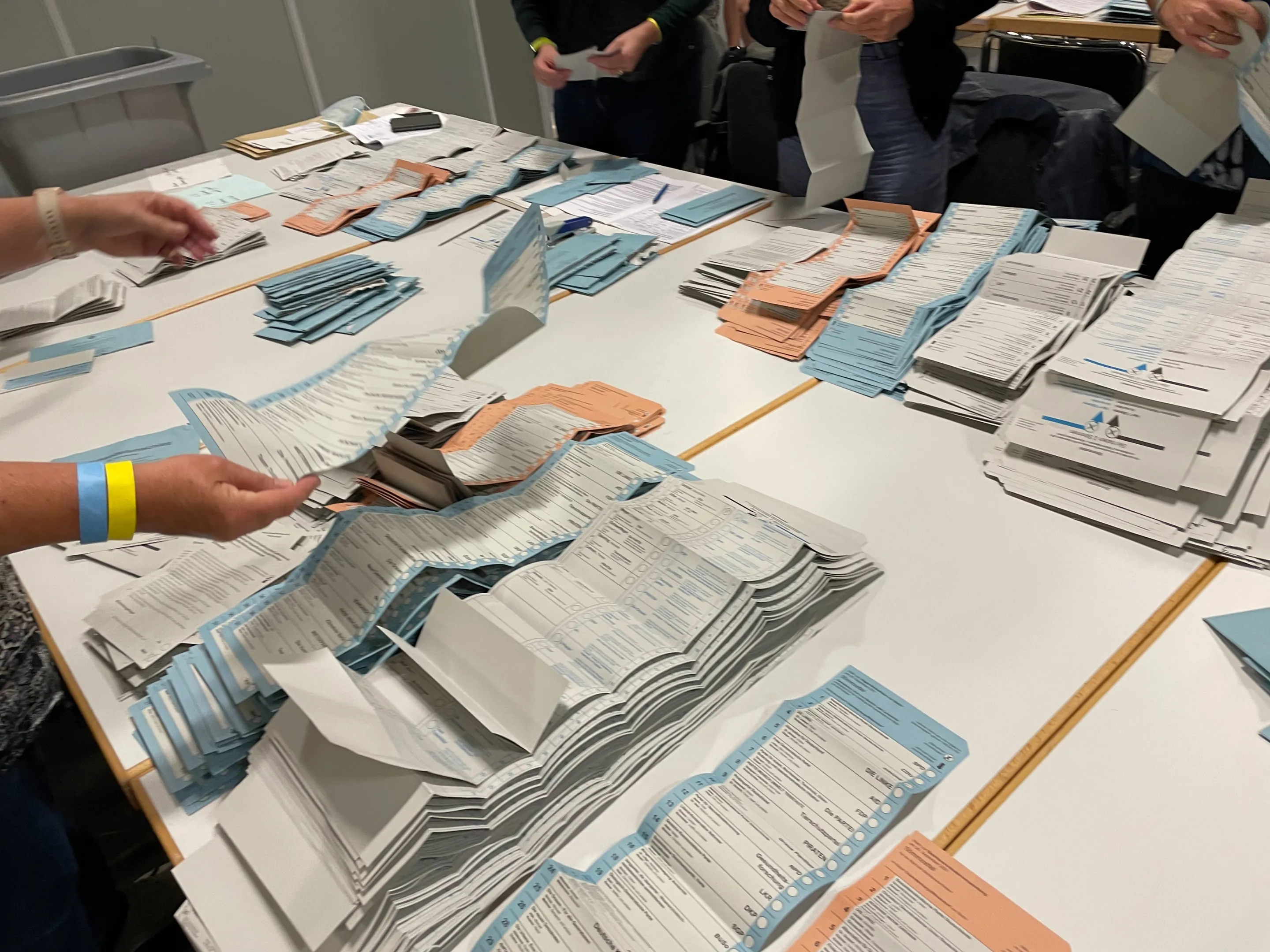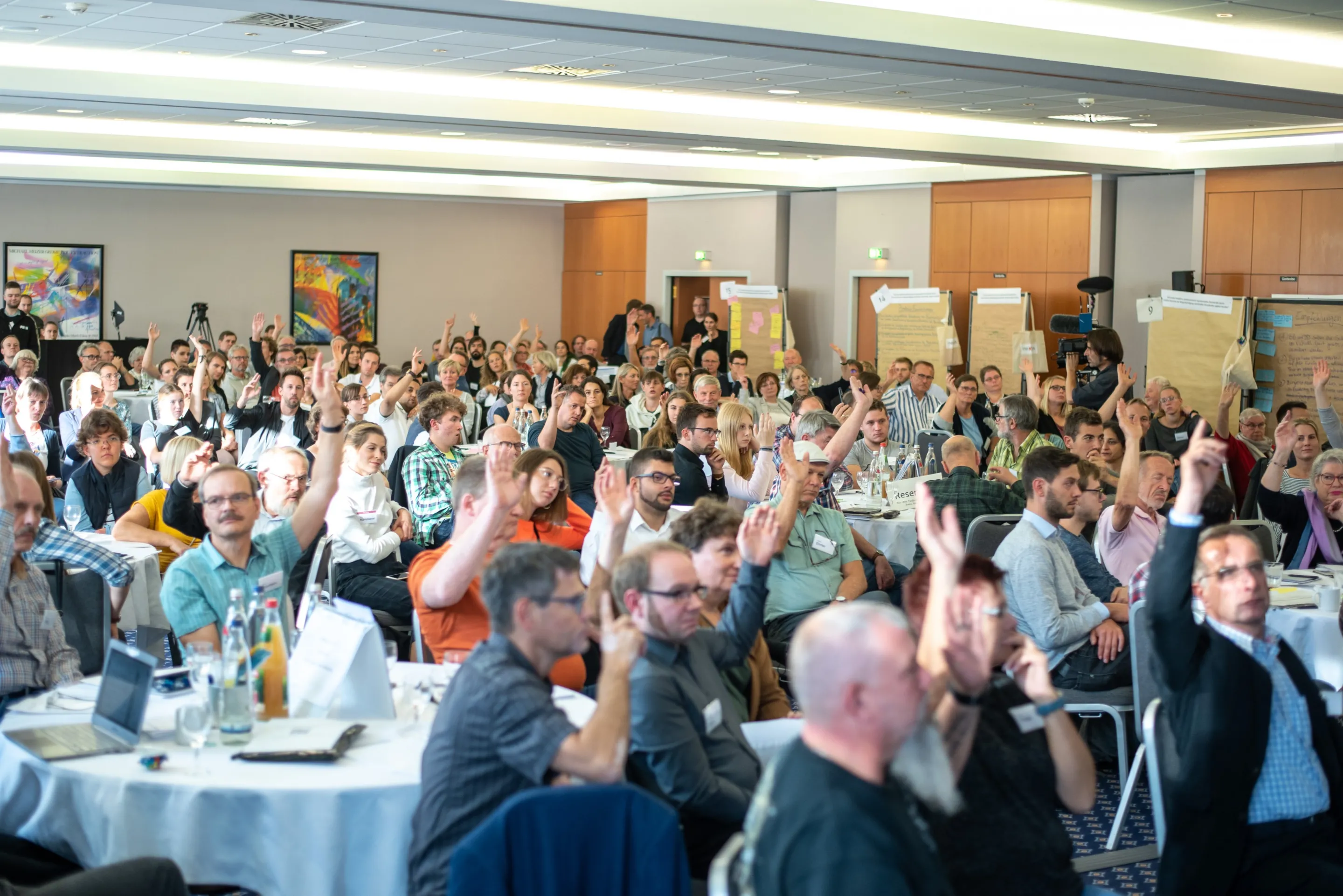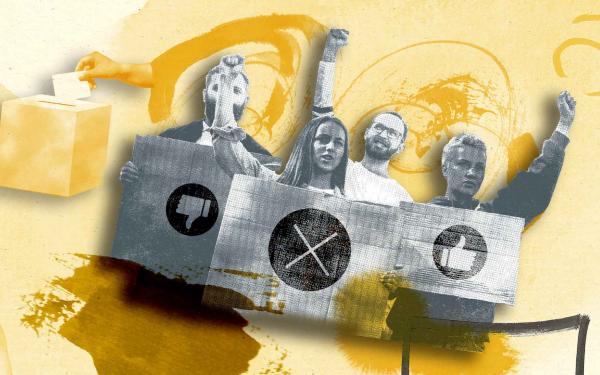From citizens' councils to feminism on TikTok – task forces investigate democracies in transition
#Science and the public #Democracy
Clemens Wronski/Mehr Demokratie CC BY-SA 2.0 DEED
With an art project, the Mehr Demokratie association wants to draw attention to the need for new forms of democratic participation, for example in the form of citizens' councils, in order to counter the current challenges.
Liberal democracy is a basic prerequisite for a scientific landscape with independent freedom of research. But how can we protect our democratic structures? And what dangers are they exposed to? Ten newly funded research projects are dedicated to these and other highly topical questions of democracy research.
The fact that a democracy comes under pressure can progress insidiously over years, or even decades, and virtually unnoticed. A specific cause is not always evident at first glance. But how can we identify the reasons for this disruptive process – and subsequently introduce adequate countermeasures? How can science generate recommendations for political action on pressing socio-political issues with the urgency called for in order to preserve the order in which we live?
Our society is resilient and not prepared to accept the undermining of its foundations by anti-democratic movements. This is proven by the many demonstrations and rallies that are currently taking place almost daily across Germany. But what impact does civic engagement have on societal transformation? How can public awareness of anti-democratic tendencies be further raised? Actively calling for public participation in scientific research could not only be profitable in this field of research, but ultimately also promote acceptance of the findings and recommendations for action. Which cooperation formats are promising in this context? And which communication formats can be developed in order to propagate the core messages of complex scientific findings in a way that is generally understandable?
In the funding initiative Transformational Knowledge on Democracies under Change – Transdisciplinary Perspectives, the Foundation recently approved around 1.9 million euros for 10 so-called task forces. In this funding format, actors from academia and (civil) society investigate the acute challenges facing democracy in Germany or at EU level. This is to take place within a twelve-month timeframe, i.e. beyond the usual pace of research. The teams publish concrete recommendations for action – and actively engage in dialogue with relevant political, social, and economic stakeholders to elucidate their recommendations. Moreover, the Foundation has now received a high double-digit number of applications for longer-term cooperation projects involving researchers and partners from (civil) society, which are now being assessed. The response to this unique funding programme in the German scientific landscape has been consistently positive, as has the quality and creativity of the applications submitted. The newly funded projects involving teams of researchers and their partners outside the academic community cover an enormously wide range:
- In the project "Shaping Democracy: Institutionalising Citizens' Assemblies in Germany", Dr Felix Petersen from the University of Münster is working with Prof Dr Daniela Winkler, University of Stuttgart, and the Mehr Demokratie association on the question of whether and – if so – how citizens' assemblies can be permanently integrated into the political system. So far, examples of this have only been found in isolated cases and for limited periods of time. The researchers now want to investigate the institutionalisation of citizens' councils by combining aspects of political science and law as well as practical participation skills.

The NurtureDEMOS project focuses on the influence of the far right on the 2024 state and local elections in eastern Germany.
- In their research project "Nurturing Democratic Resilience among Youth to Counter Far-Right Influence in the Eastern German Elections 2024 (NurtureDEMOS)", Dr Anna-Sophie Heinze and Prof Dr Eva Walther from the University of Trier, together with the Aktion Zivilcourage association, are focusing on the role of civil society and the local level in combating far-right influence. Specifically, they want to investigate the growing influence of far-right parties, and in particular the Alternative for Germany (AfD), on young voters and first-time voters in the context of the 2024 state and local elections in eastern Germany. Promoting democratic values among young people is also an aspect of their project.
- In the project "Political Polarisation and Journalistic Practices: Adding Fuel to the Fire?", Prof. Dr Michael Brüggemann from the University of Hamburg, Dr Anamaria Dutceac Segesten and Dr Mike Farjam from Lund University as well as journalists from DIE ZEIT, Swedish Public Radio and Sydsvenska Dagbladet will investigate the role of media coverage in the polarisation of debates, for which it is often held partly responsible. Among other things, they intend to publish guidelines listing evidence-based recommendations on how journalism could tackle such a polarisation of debates.
- In the project "Pop-Up Citizen Lab: Social Acceptance of Urban Innovations" Prof Dr Christoph Bieber from the Center for Advanced Internet Studies in Düsseldorf together with cooperation partners from the city of Bochum, focus on the local political level with regard to the introduction of urban innovations such as smart city infrastructures and environmental development. After all, declining trust in and criticism of public institutions often begins at the local level and spreads from there to society as a whole. To this end, so-called ‘pop-up citizen labs’ are to be created in which, for example, citizens work on various tasks in groups.

TikTok is a social network for short video clips.
- In her project "Unlearning Anti-Feminism on TikTok. Open Educational Resources and Recommendations for Actions for Political (Media-)Education", Prof Dr Michaela Kramer, together with Prof Dr Franziska Bellinger from the University of Cologne and partners from medialepfade.org - Association for Media Education take as their starting point the phenomenon that anti-feminist discourse from the right-wing spectrum is increasingly being presented as supposedly harmless lifestyle formats on the social media platform TikTok. The aim is to create open educational materials and recommendations for educational work and thus strengthen young people in their digital sovereignty and ability to act as part of preventative programmes.
- In his research project "Ways across the Country - Democracy in Transforming Landscapes", Dr Alexander Leistner from Leipzig University is cooperating with three journalists who over the next few months are travelling to Brandenburg, Saxony and Thuringia to report on the upcoming elections there and the threat of strong election gains for right-wing parties and democratic erosion. By travelling close to the population and maintaining close contact with civil society partners in rural regions, they will explore moods, concerns, and hardships as well as the changing social and political landscapes. The resulting reports are intended to offer a perspective beyond the ‘usual’ media coverage.
- In the research project "Transdisciplinary Legal, Public Policy, and Design Research on Immersive Phygital Public Spaces in Smart Cities", Prof Boris Müller from the Potsdam University of Applied Sciences, in cooperation with Dr Tehilla Altshuler and Dr Rachel Aridor-Hershkovitz, Israel Democracy Institute, and Dr Romi Mikulinsky, Bezalel Academy of Arts and Design, both in Jerusalem, wants to use design methods to accompany political processes and promote public discourse. Through data visualisation, co-design, and speculative design, for example, the ‘phygital’ (i.e. physical and digital) area in public urban space will be examined not only from an academic perspective, but also from a politically relevant perspective.
- In the project "AI used by the state: Safeguarding autonomy and human rights with transparency to citizens and support for public servants", Dr Jonas Botta from the German Research Institute for Public Administration Speyer, together with the association NExT and AlgorithmWatch want to develop a viable framework for an AI transparency register and legal requirements for its implementation. The researchers recognise the need for a comprehensive political and civil society debate on the use of AI by the state. This is because the rapid introduction of AI-based systems in public administration raises ethical and legal questions, as well as questions about the integrity of democratic societies and the rule of law as a whole.

The Citizens' Council for Democracy in Leipzig votes.
- Dr Sebastian Ziaja from the GESIS – Leibniz Institute for the Social Sciences in Cologne wants to implement a randomly selected citizens' council in a rural community in North Rhine-Westphalia and determine its influence on the political climate as part of his project "A Next-Generation Randomised Citizens' Council for Encouraging Political Participation at the Local Level (NexCiCo)" with partners from the Open Society Initiative. In this community, a decision is due to be made about the future of the local event hall, in which the citizens' council will act in an advisory capacity. It will be flanked by participation opportunities such as ‘opinion vending machines’ and social media dialogue. For example, the project aims to answer the question of whether a randomly selected, deliberative body can find a compromise that is supported by the population and politicians.
- In the research project "Testimonial Lab - Exploring modes of articulation in deep societal conflict", Priv.-Doz. Dr Hans-Jörg Sigwart, Prof Dr Roger Häußling and Dr Raphaela Kell from the Rheinisch-Westfälische Technische Hochschule Aachen are working with the German Trade Union Confederation and the Aachen Theatre to test and develop a framework to support ‘testimonial dialogues’ in order to create common foundations for democratic exchange in situations in which they are eroding or (still) lacking. Such a situation exists in the so-called ‘Rhenish mining district’, where climate change and the coal phase-out have created an environment in which profound and hardened social conflicts need to be overcome.
Democracies in transition as an ongoing theme
The Volkswagen Foundation attaches great importance to the protection of democracy and science. Its commitment to research on democracies is not only evident in its most recent funding programmes. From 26 to 28 February 2024, a networking workshop "Transformationswissen über Demokratien im Wandel" will also take place. With this workshop in Hanover, the Foundation is offering a space for networking between academics and (civil) society actors and for developing initial ideas for joint transdisciplinary research. The event is a support measure for the application process in the programme "Transformation Knowledge on Changing Democracies – Transdisciplinary Perspectives" scheduled to coincide with the deadlines for task forces (expected autumn 2024) and cooperation projects (1st half of 2025).
In addition, on 4 and 5 November 2024, the researchers funded in the task forces of the ‘Transformation knowledge about democracies in transition’ funding initiative and their partners other than academics will meet at Herrenhausen Palace and present their initial results in a forum. The researchers' forum will be accompanied by an evening event on 5 November, which is open to the public.
In addition, there will be a Herrenhausen XChange on 26 November 2024 on the topic of "What can I do as an individual in times of (supposed) polarisation in my environment?", which is also aimed at the general public.
Protect academic freedom!
The Volkswagen Foundation reaffirms its commitment to the protection of democracy and academic freedom in a detailed statement.

